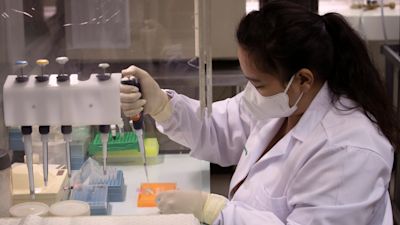Thailand delays AstraZeneca Covid vaccine after European countries halt jabs over unproven blood clot fears

Thailand has followed several European countries and delayed the use of the Covid-19 Oxford/AstraZeneca vaccine following reports of blood clots in some people - though there is as yet no firmly established link with the jab.
A media event with Thai prime minister Prayuth Chan-ocha receiving his first jab was cancelled less than an hour before the scheduled start in the wake of the decision.
In a news conference, health officials said the delay was based on the decision made by Denmark, Austria and others, as a precaution.
The Danish health authority said on Thursday it has no evidence the vaccine was responsible for blood clots.
Other experts pointed out that of the millions of AstraZeneca vaccine jabs administered elsewhere, including in the UK, there have been no reported cases of the vaccine causing blood clots or related problems.
ITV News Science Editor Tom Clarke said: "The incidence of blood clots seen so far following 11m doses of AstraZeneca vaccine - no higher than what we would expect to see in unvaccinated people."
Yong Poovorawan, an adviser to Thailand’s vaccination programme, said the delay – pending an investigation into the cause of the reported side effect – will not have a big impact on the rollout.
The UK’s Medicines and Healthcare products Regulatory Agency (MHRA) said evidence had not confirmed the vaccine caused the problems, and said people should still go and get their Covid-19 vaccine when asked to do so.
Søren Brostrøm, director of Denmark's National Board of Health, had earlier said: "There is good evidence that the vaccine is both safe and effective.
"We and the Danish Medicines Agency have to react to reports of possible serious side effects."
Thailand started its vaccination drive last month with an initial 200,000 doses of China’s Sinovac and 117,000 doses of AstraZeneca, which is also being manufactured locally.
The country aims to administer 10 million doses per month from June, and plans to cover at least half its population by the end of the year, though some say the campaign is too slow and inadequate.